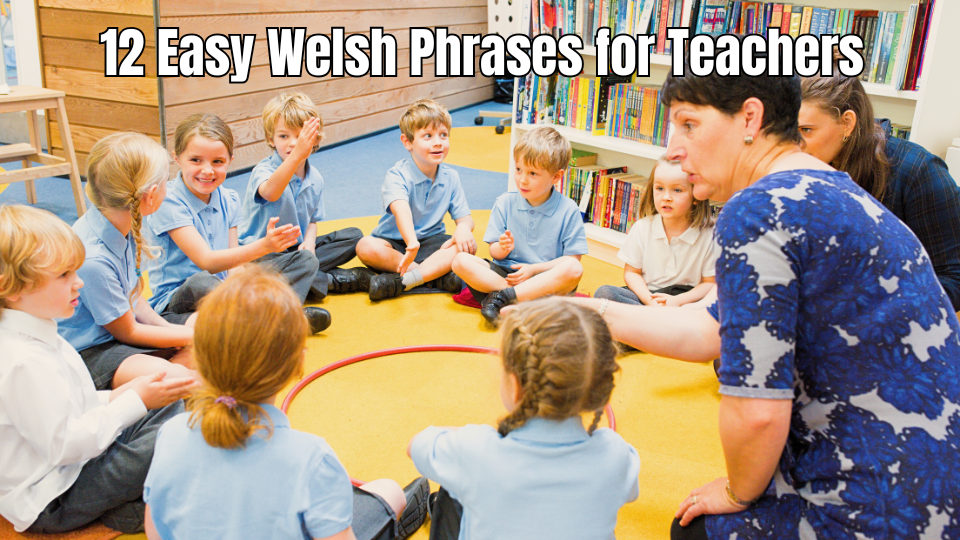
12 Easy Welsh Phrases for Teachers
While more schools in Wales seek to promote bilingualism, teachers are increasingly aware of the necessity of using Welsh phrases in everyday teaching. By using straightforward Welsh etiquette and urging pupils to speak Welsh, educators can foster a more bilingual and inclusive learning culture and promote students’ language acquisition. Below is a how-to guide for using Welsh in the classroom, with phrases that can be applied in real life.
Why Learn Welsh in the Classroom?
Welsh is an integral part of Welsh culture and history. To have it in school will not only give students the opportunity to learn the language but also broaden their cultural experience. Welsh phrases may seem a struggle to learn for English-speaking teachers, but practicing a couple of key phrases will make it easy for any teacher to begin making a difference.
There is another benefit of speaking Welsh words for non-Welsh-speakers, because it creates a sense of inclusion and promotes the acquisition of a second language from an early age. What’s more, you don’t need to be fluent to include Welsh in your daily teaching - you just have to learn and use simple, productive phrases.
Basic Welsh Phrases for the Classroom...
Below are a few basic Welsh phrases that can be practised by teachers throughout the day. For each phrase, the pronunciation is given along with a short description, so teachers feel confident. If you went to school in Wales, some of these phrases might already be familiar to you. How many phrases can you recognise?
1. Paid bwyta hynny (Don’t eat that)
[Pa-id bwoi-ta hun-ee]
We’ll start the list off with a phrase that can be applied throughout the school, whether that’s the dinner hall, the classroom or the yard! This is useful when reminding children not to eat items that aren't edible. It’s polite but firm, helping to set clear boundaries when they children are snacking on something they shouldn’t be!
2. Tawelwch (Silence)
[Ta-well-ooch]
“Tawelwch” is an effective one-word command that gently yet firmly signals pupils to focus without sounding too harsh. This phrase creates an immediate sense of calm and helps refocus attention, especially during transitions between activities or when giving important instructions. By using “tawelwch” regularly, you establish a consistent cue for quiet, encouraging students to recognise it as a respectful request to settle down.
3. Clustiau gwrando / gwrandewch (Listening ears, listen)
[Clew-sty-eye goo-ran-do / goo-ran-dewch]
Next up are two useful phrases to use in conjunction with “tawelwch”. Use "clustiau gwrando" to encourage pupils to have their "listening ears" on, promoting attentive listening. Adding "gwrandewch" as a command reinforces the action of listening, especially when you need the pupils to pay close attention immediately. For instance, before giving important instructions, say, "Clustiau gwrando, gwrandewch!"

4. Eisteddwch (Sit down)
[Eye-sted-ooch]
Use this phrase to ask pupils to take their seats. It's handy during transitions, after activities, or at the beginning of lessons. By consistently using “Eisteddwch,” you can establish a respectful, routine way of regaining students' attention and creating a calm, seated environment.
5. Sefwch (Stand up)
[Sev-ooch]
This phrase is useful during activities that require students to stand, such as games or assemblies. When paired with “Eisteddwch,” “Sefwch” helps students understand and respond to classroom routines, reinforcing structure and making it clear when they should be active and attentive.
6. Dewch i mewn (Come in)
[Deh-ooch ee me-own]
“Dewch i mewn” is a warm and inviting way to welcome students as they enter the classroom. Using this phrase helps create a friendly and inclusive atmosphere right from the start of the day or at the beginning of each lesson. With this simple phrase, you can establish a positive tone that encourages students to feel at ease and ready to learn. Over time, “Dewch i mewn” can become a comforting routine, signaling that the classroom is a safe, welcoming space.

7. Ewch i mewn (Go inside)
[Eh-ooch ee me-own]
Use this phrase when directing students indoors after break or when they need to Use “Ewch i mewn” as a directive to guide students indoors, such as after playtime, lunch, or outdoor activities. This phrase provides a clear, structured transition from the energy of outdoor activities back to the classroom setting. By using “Ewch i mewn,” you can help students shift from active play to a more focused, calm mindset for learning. It’s a practical command that gently prompts them to move with purpose and respect.
8. Amser cinio (Lunch time)
[Am-ser kee-nee-oh]
“Amser cinio” is a lively, clear way to announce that it’s lunchtime. This phrase can become part of your classroom routine, signaling a well-deserved break in the day. Try saying, “Mae'n amser cinio!” (It’s lunchtime!) with a friendly tone to mark the transition and help students recognize that it’s time to unwind and refuel. Incorporating “amser cinio” into daily routines creates a rhythm in the school day, making transitions smoother and more enjoyable.
Here are some more useful terms (depending on which snacks your school offers the children of course!)
- Tost [tost]
- Ffrwythau [froo-ith-eye]
- Llaeth [hl-eye-th]
- Dŵr [doorr]

9. Amser chwarae (Play time)
[Am-ser ch-wrye]
“Amser chwarae” is an exciting way to announce that it’s time for play, giving students the green light to release energy and enjoy some free time. When you say, “Mae'n amser chwarae!” (It’s playtime!), you’re inviting them to switch from focused learning to active play. Adding structure to this phrase can further support transitions - try using additional commands like “Ewch allan” (Go outside) to direct students toward play areas or “Dewch yn ôl” (Come back) to signal the end of playtime.
10. Amser carped (Carpet time)
[Am-ser car-ped]
"Amser carped" is a great phrase for gathering younger students together for storytime, group discussions, or circle time on the carpet. Use it to signal a shift from individual activities to a shared, interactive moment on the carpet. Saying "Mae'n amser carped!" (It’s carpet time!) helps students transition calmly and focus on a communal activity. Over time, this phrase will signal that it’s time for listening, learning, or sharing with classmates.

11. Peidiwch (Stop/Don’t)
[Pay-dee-uch]
"Peidiwch" is a versatile word in Welsh, meaning "Don’t" or "Stop" and can be used alone or with other words to guide children in managing their behavior. It's particularly useful for gently yet firmly setting boundaries in the classroom without raising your voice.
12. Dwylo caredig (Kind hands)
[Doy-lo ka-re-dig]
This useful phrase, “Dwylo caredig” (Kind hands), reinforces positive behavior by gently reminding pupils to interact thoughtfully and respectfully with one another. It’s especially effective with younger children, encouraging them to keep their hands to themselves and use gentle touch in their interactions. This phrase can be used during group activities, playtime, or anytime you want to promote a caring and considerate environment.
1. What does the Welsh phrase “Dewch i mewn” mean in English?
- a) Go outside
- b) Come in
- c) Sit down
- d) Be quiet
2. If you wanted to remind students to “have kind hands” in Welsh, which phrase would you use?
- a) Peidiwch â sgrechian
- b) Dwylo caredig
- c) Ewch allan
- d) Clustiau gwrando
3. Which of the following phrases would be best to use when announcing it’s time to play outside?
- a) Amser cinio
- b) Sefwch
- c) Amser chwarae
- d) Eisteddwch
4. How would you tell students “Don’t shout” in Welsh?
- a) Peidiwch â sgrechian
- b) Peidiwch â chynhyrfu
- c) Peidiwch â siarad
- d) Peidiwch â bwyta hynny
5. What does the phrase “Clustiau gwrando” encourage students to do?
- a) Sit down
- b) Stand up
- c) Use listening ears
- d) Be quiet

